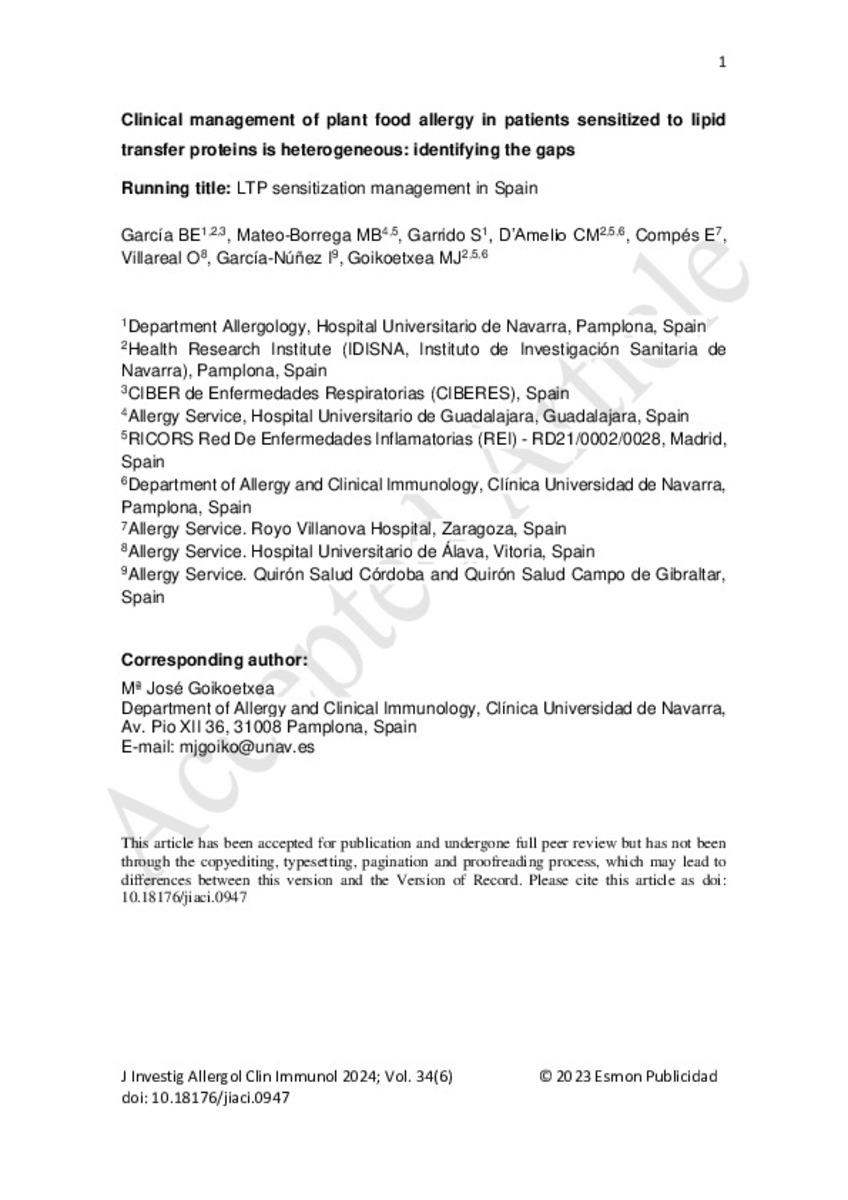Full metadata record
| DC Field | Value | Language |
|---|---|---|
| dc.creator | Garcia, B.E. (Blanca Esther) | - |
| dc.creator | Mateo, M.D. (María D.) | - |
| dc.creator | Mateo-Borrego, M.B. (María Belén) | - |
| dc.creator | Garrido-Fernández, S. (Sara) | - |
| dc.creator | D'Amelio-Garofalo, C.M. (Carmen Mariana) | - |
| dc.creator | Compés-García, E. (Esther) | - |
| dc.creator | Villarreal-Balza-de-Vallejo, O. (Olga) | - |
| dc.creator | García-Núñez, I. (Ignacio) | - |
| dc.creator | Goikoetxea-Lapresa, M.J. (María José) | - |
| dc.date.accessioned | 2024-01-30T08:06:18Z | - |
| dc.date.available | 2024-01-30T08:06:18Z | - |
| dc.date.issued | 2024 | - |
| dc.identifier.citation | Garcia, B.E. (Blanca E.); Mateo, M.D. (María D.); Mateo-Borrego, M.B. (María Belén); et al. "Clinical management of plant food allergy in patients sensitized to lipid transfer proteins is heterogeneous: identifying the gaps". Journal of Investigational Allergology and Clinical Immunology. 34 (6), 2024, 1 - 32 | es |
| dc.identifier.uri | https://hdl.handle.net/10171/68631 | - |
| dc.description.abstract | Background and objective: Patients sensitized to lipid transfer protein (LTP) present a wide clinical variability. The lack of practical diagnostic and therapeutic guidelines complicate their management. The aim of the study was to describe the clinical approach of Spanish allergists to this pathology using a survey designed by PICO method and subsequent Delphi approach validation. Methods: Designed survey was answered by 224 allergists (75% women; 57.1% with >20 years of professional experience). Homogeneity regarding clinical practice on the main points of LTP allergy diagnosis was observed, except for patients with suspected NSAID hypersensitivity (44.6% frequently include LTP skin testing). Oral food challenges were not frequently performed (63.6% occasionally to never), and they were generally (75.5%) used to confirm tolerance. It was common to recommend fruit skins avoidance (77.2%) and maintaining consumption of foods to which patients are sensitised but tolerant (99.1%). Results: There was heterogeneity on other dietary indications, modifications due to co-factors, or traces avoidance. Peach sublingual immunotherapy (SLIT) was considered very/quite effective by 55.9% of allergists. The majority (79.5%) consider SLIT indicated in <25% of LTP allergic patients, based on severity (95.2%), frequency of reactions (99.4%), allergy to multiple food families (97.4%), and the quality of life/nutrition impairment (91.5%). There was different practice on SLIT prescription based on co-factor involvement. Conclusion: These data suggest that there is a need to increase evidence to reduce the clinical practice heterogeneity in the management of LTP allergy. | es_ES |
| dc.description.sponsorship | The project was funded by Foundation of Spanish Society of Allergy and Clinical Immunology, by donation from ALK-Abelló S.A., Roxall Medicina España S.A., Allergy Therapeutics Iberica S.L. and Diater Laboratorio de Diagnóstico y Aplicaciones Terapéuticas S.A. | es_ES |
| dc.language.iso | eng | es_ES |
| dc.publisher | Esmon Publicidad | es_ES |
| dc.rights | info:eu-repo/semantics/openAccess | es_ES |
| dc.subject | Materias Investigacion::Ciencias de la Salud::Alergia | es_ES |
| dc.subject | Avoidance-diet | es_ES |
| dc.subject | Diagnosis | es_ES |
| dc.subject | Food allergy | es_ES |
| dc.subject | Lipid transfer protein | es_ES |
| dc.subject | Management | es_ES |
| dc.subject | Peach allergy | es_ES |
| dc.subject | Sublingual immunotherapy | es_ES |
| dc.subject | Treatment | es_ES |
| dc.title | Clinical management of plant food allergy in patients sensitized to lipid transfer proteins is heterogeneous: identifying the gaps | es_ES |
| dc.title.alternative | LTP sensitization management in Spain | es_ES |
| dc.type | info:eu-repo/semantics/article | es_ES |
| dc.identifier.doi | 10.18176/jiaci.0947 | - |
| dadun.citation.endingPage | 32 | es_ES |
| dadun.citation.number | 6 | es_ES |
| dadun.citation.publicationName | Journal of Investigational Allergology and Clinical Immunology | es_ES |
| dadun.citation.startingPage | 1 | es_ES |
| dadun.citation.volume | 34 | es_ES |
Files in This Item:
Statistics and impact
Items in Dadun are protected by copyright, with all rights reserved, unless otherwise indicated.






